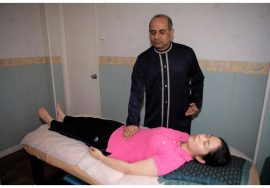
BEGIN YOUR DAY WITH A GOOD NIGHT’S SLEEP
According to Ayurveda, sleep is the second important sub pillar which helps to sustain our body structure and maintain good health.
Ayurveda says, people who can sleep well at night are really blessed. Sleep is very important for many reasons, e.g. during sleep the body gets the time and opportunity to do its repairing work, while the brain, heart, lungs, etc. are able to slow down and relax.
This helps us feel reenergised and rejuvenated the next morning after we wake up. In winter, the nights are longer compared to in other seasons, thus, it becomes more necessary that the quality of sleep is good. If the quality of sleep is not good, this can cause Vata (air element) disorder. This can have a weakening effect on one’s nervous system, which in turn further causes sleeping disorders.
In this blog, I talk about sleep, sleeping disorders, what causes such disorders, the common consequences of sleeping disorders and the Ayurvedic & Yogic solutions to correct the disorders and thereby improve our health.
Ayurveda says, generally each one of us go through 3 stages of sleep before we actually fall into a deep sleep. Those are as follows:
Main stages of Sleep:
- Jagrut Awastha (Awakefulness)
- Tandra (Half asleep)
- Swapna (Dream)
- Nidra (Sound sleep)
The first stage is when we go to bed and try to fall sleep. At this stage, we generally have the experience of several thoughts crossing our minds. Then, after some time, due to tiredness, we doze off. This is called the “Tandra” stage, when we feel half asleep and half awake.
Then we enter into the 3rd stage, when we have dreams. At this stage, the conscious mind is asleep, but our subconscious mind is still active and restless. Due to the thought process happening at the subconscious level, we have dreams.
After this 3rd stage, those who are lucky, can enter the 4th stage of sleep, which is actually “real sleep”. At this stage, we are totally relaxed at the physical and mental (conscious mind and subconscious mind) levels.
Unfortunately, nowadays, due to wrong diet, unhealthy lifestyle, and several external factors, many people cannot reach this fourth and final stage of deep sleep – thus, many people increasingly experience different health issues caused by the lack of good sleep, and by sleeping disorders.
Broadly speaking, there are mainly three types of sleeping disorders, which are as follows:
- Insomnia – when a person cannot fall asleep at all.
- Disturbed sleep – due to physical exhaustion, one can fall asleep, but due to the restless subconscious mind, one cannot have uninterrupted deep sleep for a sufficient period of time. And as a result, the sleep is disturbed. One wakes up a few times in the middle of the night and goes back to sleep. Quite often, it takes a very long time for one to fall asleep again, and at times, unfortunately, one cannot go back to sleep. The mind is wide awake and restless, moving from one thought to another, most of which are generally unnecessary.
- Sleep Apnea – this refers mainly to disturbance in the breathing pattern when someone is asleep. There are different kinds of sleep apnea which I will discuss in a future article.
Common Causes of sleeping disorders:
- No proper bed time – Ayurveda says, the ideal time to go to bed is during the “Kapha” time in the evening, which is in generally from 6:00 pm to 10:00 pm. But in big cities around the world, it may not be feasible for most people to go to bed before 10:00 pm. Then, Ayurveda says that one should go to bed latest by 11:00 pm.
It is said in Ayurveda that 1 hour of sleep before midnight, is equivalent to 3 hours’ sleep after midnight. So, from this perspective, the time one goes to bed is more important than how many hours one sleeps for.
There is a common misconception with regard to how much sleep one needs. Generally, there is a common yardstick used to measure how long one should sleep for. Ayurveda differs from this common misconception. According to Ayurveda, an adult with Vata as the primary dosha will need much less sleep compared to what is required for an adult with a strong Kapha dosha. Also, a young adult may need more sleep compared to an elderly person, and a child would need the most amount of sleep compared to an adult or an elderly person. There is an elaborate, logical and scientific explanation given in this regard in Ayurveda.
2. Wrong Eating habits – especially at night. According to Ayurveda, one should not eat a heavy meal after sunset, because if someone eats a large quantity in the evening, the digestive system will need to work longer to digest the food. And when the digestive system is busy working on digesting food, one’s mind/brain cannot relax – this can definitely disturb one’s sleep.
Particularly in winter, if someone eats uncooked vegetables in the evening, Vata dosha in that individual’s system will become imbalanced, because the food will remain in the digestive tract for longer than it should, and this will probably disturb the free movement of the air element in the stomach and abdominal region. And when Vata is disturbed in the digestive system, it will surely make one’s mind very restless, because Vata has a strong influence on the mind, resulting in disturbed sleep.
3. Unhealthy Lifestyle – the most common mistake people make in modern times is – we do not live our lives in tune with the cycles of nature. Most of us perform activities which do not match the universal clock, even though the activity itself may be right and healthy. For example, Ayurveda says that the best time to exercise is in the morning, during the Kapha time (approximately, between 6:00 am and 10:00 am).
But generally people do not have enough time to exercise in the morning because they get up quite late, just in time to get ready, to have breakfast and get to the office. And most people, at least the office workers, go to gyms and health clubs in the evenings to workout, to sweat and feel physically tired, to be able to sleep at night.
From an Ayurvedic perspective, this is completely wrong. Ayurveda says, one should unwind one’s whole system and relax in the evening. If it is really needed to improve blood circulation, one can do some stretching exercises, and some Pranayama afterwards, to calm the body and mind, which is required to induce good sleep.
When one does vigorous exercises in the evening, thinking that this would help one to sleep well at night, it actually has a contrary effect. Although physical tiredness may help the person to fall asleep initially at the conscious level, his subconscious mind and brain can remain restless due to plenty of oxygen supply within his body, particularly to his brain caused by heavy breathing whilst doing vigorous exercise. Due to this, his sleep will certainly be disturbed.
Ayurveda says, not only the activity has to be right, but the timing also should be right, only then can one benefit from those activities.
Now the question arises, how can one correct such disorders and enjoy good quality sleep, particularly in winter when the nights are longer, compared to summer.
General Guidelines :
- Eat, sleep and wake up at the same time every day.
- Eat and drink only when hungry and thirsty – this helps to avoid creation of Ama (toxic mucus). Ama is a product of altered digestion and metabolism & it impairs body systems & functioning of the mind & brain, resulting in physical tiredness & mental disorders.
- Maintain a gap of at least 1 hour between dinner and bed time.
- As bedtime approaches, slow down physically and mentally – consider some light reading, soothing music, meditation, prayer, etc.
- Set your bedroom temperature at a comfortable level – neither too cold nor too hot.
- Avoid excessively spicy foods, fried foods, junk foods, aerated/fizzy drinks, alcohol, smoking, etc.
- Avoid caffeine, particularly in the evening.
- Avoid high-fructose corn syrup, artificial sweeteners, sugary foods, candy, etc.
- Avoid processed foods with preservatives.
Simple Home Remedies:
- Chew 1 teaspoon of coriander seeds after dinner. You can add a little ground rock sugar or some jaggery to it.
- Soak 1 teaspoon of poppy seeds in a little hot water in the morning. Make a paste from the seeds in the evening and mix it in about 100 – 150 ml warm water and drink it.
- Lick 1 teaspoon of black sesame seed powder mixed with a teaspoon of pure honey in the evening.
- Drink a glass of room temperature water, adding ½ teaspoon of soda bicarbonate.
- Boil approximately 300 ml water, adding ¼ teaspoon turmeric powder and a pinch of black pepper powder. Drink this water 30 minutes before going to bed.
- Drink a glass of hot water, adding 1 tablespoon of virgin olive oil/virgin coconut oil, at night 30 minutes before going to bed.
- Soak 2 almonds & 2 black pepper corns in hot water overnight. Next morning, peel off the skin of the almonds & chew them well, together with the black pepper corns, before breakfast. Almonds are a natural brain/nervine tonic (and also good for eyesight), while black pepper helps to digest the almonds & also enhance oxygen supply/circulation to the brain. This can promote calm & rational thinking, and help prevent one from becoming overly fatigued.
- Soak 1 walnut with 1 pod cardamom seeds & ½ inch cinnamon stick in normal water, overnight. Eat all together the next morning, before breakfast. Walnuts (which are shaped like the human brain) are an excellent memory booster & help induce good sleep, which is vital for relaxing the nervous system & helping one to handle stressful situations in a calm and objective manner. Cinnamon helps maintain body temperature & promotes deep and uninterrupted sleep, which nourishes the mind, body & nervous system. Cardamom assists in eliminating toxins from the body in a timely manner. This can help to prevent aggravation of Pitta (fire element) and/or Vata in the lower abdomen, which can induce good sleep.
- Focus on your breathing pattern without controlling/regulating the breath.
- Include light sweets, lots of fruits like raisins, dates, pomegranate, sugarcane juice, and vegetables in your diet.
- Use honey, jaggery or stevia as an alternative to white sugar.
- In short, food items that have a sweet taste and have a strong earth element, eg. Avocado, sweet potato, etc. can help promote good sleep.
Herbs useful in improving quality of sleep:
- Bhringraj – False Daisy/Eclipta prostrata
- Amla – Indian Gooseberry
- Brahmi – Bacopa Monnient
- Shankhapushpi – Clitoria Ternatea (Convolvulus pluricaulis)
- Guduchi – Tinospora Cordifolia
Ayurvedic Head Massage :
Herbal Oils To Be Used:
- Pure almond oil
- Pure Ashwagandha oil
- Pure brahmi oil
- Pure virgin coconut oil
- Cold pressed sesame oil
- Bhringraj/Mahabhringraj oil
YOGIC SOLUTIONS:
- Bhujangasana (Cobra Pose)
- Shalabhasana (Locust Pose)
- Yogic dips
- Chandra Bhedan/Surya Bhedan
- Shitali and Sheetkari Pranayam
- Anulom – Vilom Pranayam
- Mantra Meditation (e.g. OM – AUM)
- Shavasana (Corpse Pose)
To book an online appointment at Ayuryoga, with our Ayurveda/Yoga Expert Mr. Vinod Sharma Hong Kong please click here.












